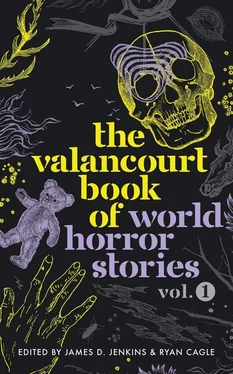The old man began to swing him. Slowly, from left to right, moving his body like a pendulum.
Overcoming his fear, Esteban sought answers:
‘Why are you doing this to me? What do you want? Answer me!’
A lightning flash illuminated the old man’s face. In that final moment, Esteban understood. Señor Ligotti looked at him with a mixture of curiosity and impatience, the same way a human observes the slow movements of a mollusk. He wasn’t a madman: he was a higher being. A god who was toying with him just like a boy playing with ants.
The old man’s voice rose above the sound of the wind and rain:
‘Si non oscillas, noli tintinnare.’
Esteban felt him let go, the vertigo of the fall, the abyss sucking him towards a certain death. He closed his eyes and hugged himself, anticipating the position of his body in its shroud.
But he didn’t fall. Señor Ligotti held him once more by the leg and then dragged his body over the edge of the terrace until he placed him safely on the roof. Esteban remained curled up in a ball, trembling and crying like a newborn baby. The old man leaned over him. He brushed the wet hair back from his face and positioned it behind his ears. Then he kissed him on the forehead.
Esteban closed his eyes, fearing the real denouement: his rival’s hands strangling him or disemboweling him with a knife.
He opened them seconds later. Señor Ligotti had disappeared.
When the police visited him in the hospital where he was recovering from an inevitable rhinoplasty, Esteban decided that he wouldn’t press charges against Señor Ligotti. He was terrified to face him again, to have a confrontation with him. He stated that because of the darkness he hadn’t been able to see his attacker’s face; that he had no enemies nor the slightest idea of who had been responsible for the assault.
While this was going on, Clemente supervised the moving of everything from the apartment in Calle de Berlín to Adela’s mother’s house. Esteban didn’t want to set foot in that place again. He would await the imminent birth of his child sheltered under his mother-in-law’s roof. Afterwards, calmly, he would seek a new home for his family.
The birth and the first month of infancy kept his mind busy. However, it didn’t take long before he fell into a deep depression. He started therapy with a psychologist who, after hearing his terrifying story about Señor Ligotti, suggested he commit it to paper.
‘You could try writing a novel. It would help you. Isn’t that what you writers do all the time? Exorcize your traumas through literature . . .’
Esteban was reluctant at first but wound up accepting the advice. After a slow, painful start, when he was on the verge of abandoning the project, he entered an inspired catharsis: the ideas flowed at a dizzying rhythm, the plot fit together with a coherency he had never before experienced. Four months later he finished the novel, which he entitled Señor Ligotti . He sent it to several publishers with the certainty that he had just written his best book.
The first offer didn’t take long to arrive. To his delight, it came from Grau Press. The novel, retitled by some genius in the marketing department as Sinister Stalking , was an immediate success. His bank account grew with equal speed and he was able to get a modest apartment on the outskirts of the city. This time he hired a lawyer to deal with the contract.
Fortune smiled on him. But by now Esteban wasn’t naive, he couldn’t be after recent events.
Everything had a price. It was just a matter of waiting for the bill collector to show up.
His son turned two. During all this time, Esteban didn’t write anything. Sinister Stalking continued to be reprinted; the royalties it generated were enough for them to live well and he preferred to devote himself to his family. He didn’t miss creative work and even stayed away from public events. He started to think of retiring, of the possibility of remaining connected to literature through teaching. A couple of universities showed interest in hiring him. Maybe, he sometimes mused in the early morning hours when suffering from insomnia, he had written everything he had to write.
There was also another possibility: that he was paralyzed by the fear of not being able to surpass Sinister Stalking ’s success.
As if he divined his thoughts, the director of Grau Press called one morning to invite him to the office. We have to talk, he said. Esteban accepted out of politeness: they were his publisher, he lived off them, he couldn’t say no. He saw it as a courtesy visit.
As he checked in at the lobby, he was relieved not to see Ligotti Industries in the directory. He relaxed even more when he got off the elevator on the top floor and discovered that his old enemy’s offices were for rent. Where had he gone? Had he died? What did it matter? The truth was that he was glad to avoid him.
The director received him with forced enthusiasm. He was an executive who didn’t know much about books; on the other hand, he mastered numbers and accounts to perfection. They made small talk for a long while. Esteban’s discomfort was growing. He began to look for an excuse to get out of there.
Suddenly, the director took his arm and led him down a hallway.
‘Actually, it’s the owner who wants to speak with you.’
Esteban was surprised. He had never dealt with him.
‘And to what do I owe the honor?’
‘He’s concerned because you haven’t sent in anything new . . .’
They arrived in front of an enormous wood door. It was old, with elegant carvings. On the upper part, in the middle, a phrase was inscribed:
SI NON OSCILLAS, NOLI TINTINNARE
Esteban’s back went stiff. His vision clouded and he felt the urge to vomit.
The director put his hand on the doorknob.
‘. . . and when an author gets writer’s block, he likes to help. He knows different methods for stimulating the imagination.’
The door opened, the director pushed him inside. Esteban was petrified, incapable of opening his eyes, until he heard a voice:
‘Welcome. Sit down.’
It belonged to a young man. Esteban raised his eyelids. Behind the desk he saw a blond-haired fellow, clean-shaven, with horn-rimmed glasses. He felt ridiculous. His paranoia had gotten carried away again. The answer was obvious: Señor Ligotti knew this office; surely this was where he’d gotten the phrase from.
He approached the desk, still nauseous from the shock, and sat down.
‘Sorry, I don’t feel well.’
He closed his eyes again. The air in the office was thick, hot; Esteban felt he was suffocating.
With excessive familiarity, the owner asked him:
‘Are you drunk?’
Then, changing the subject, he added:
‘I have something for you . . .’
Esteban heard him open a drawer. Then he heard something that terrified him, a sound that confirmed what he already feared: that his nightmare was really just beginning.
‘ . . . it’s the contract for a new book.’
Behind him, from some corner of the office, the sound continued to be heard.
The jingling of a hand loaded with rings.
Translated from the Spanish by James D. Jenkins
Michael Roch
THE ILLOGICAL INVESTIGATIONS OF INSPECTOR ANDRÉ DESPÉRINE
Supernatural sleuths and occult investigators might not be anything new in the horror genre, but we’ve never come across one quite like Michael Roch’s André Despérine. Posted to a remote region that no one, including he, has ever heard of, the incompetent and shamelessly opportunistic policeman Despérine somehow manages to find himself involved in one paranormal case after another. Roch ( b. 1987) , who lives in Martinique – a Caribbean island whose tropical forests and beautiful white sand beaches seem to make it an unlikely wellspring of horror fiction – primarily writes in the fields of science fiction and Afrofuturism, but fortunately for us also occasionally dabbles in horror. This trio of interlinked tales – you’ll have to read all three to see how they fit together – first appeared in 2012 and marks the author’s English-language debut.
Читать дальше











